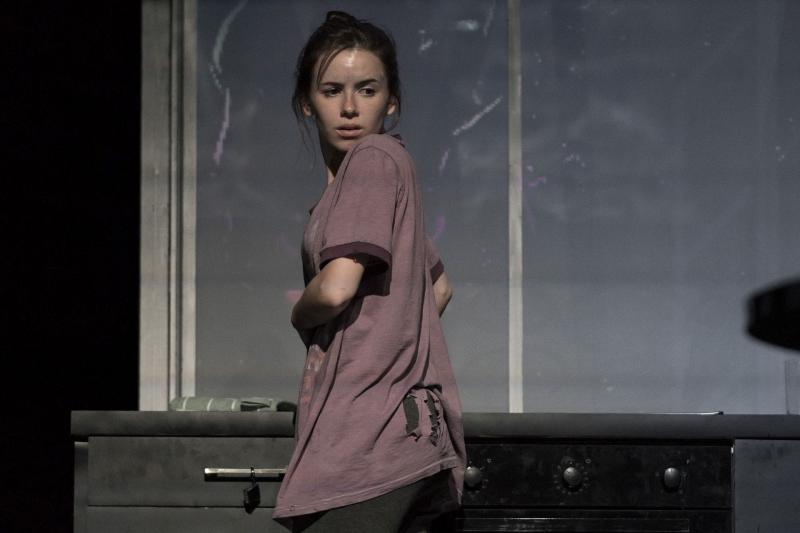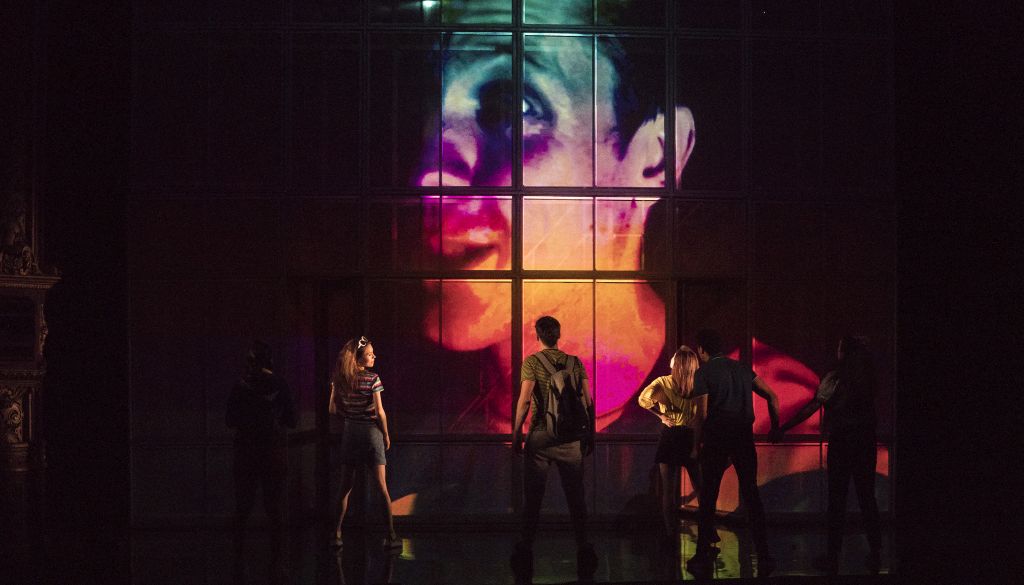Asking For It, Birmingham Repertory Theatre review - victim-blaming and abuse in small town Ireland | reviews, news & interviews
Asking For It, Birmingham Repertory Theatre review - victim-blaming and abuse in small town Ireland
Asking For It, Birmingham Repertory Theatre review - victim-blaming and abuse in small town Ireland
Story of sexual consent leaves the audience squirming

In a world where the contentious report of a young English woman gang raped by teenage boys in Cyprus last year continues to make headlines, Asking For It is more than relevant. Such scenarios are by no means new but are once again making news.
The play itself is an adaptation by Meadhbh McHugh of Irish writer Louise O’Neill’s young adult novel from 2015, and tackles issues of sexual consent in the social media era head-on, in a way that has no truck with the usual, tired stereotypes that usually frame such tales. That the UK debut of this breath-taking and award-winning piece of Irish theatre is being staged at Birmingham represents quite a coup for the Repertory Theatre there, even though many were probably not aware what they were letting themselves in for.
The lead role of Emma is again taken by Lauren Coe, who also starred in the director Annabelle Comyn's premiere at the Everyman Theatre in Cork. Emma is an arrogant and less than sympathetic young woman, at least initially, who lives in a small town in Ireland, and Coe leaves no doubt as to this young woman’s character: she is queen bee of her group of friends and is more than capable of throwing her weight around to get what she wants. Emma’s life is turned on its head, however, when she is gang raped by the captain of her school’s football club and his mates at a party and images of her unconscious body are posted on social media. In a town where everyone knows everything about each other, the effect is about as shattering as it could possibly be to a person not yet out of her teens.
Emma’s life is turned on its head, however, when she is gang raped by the captain of her school’s football club and his mates at a party and images of her unconscious body are posted on social media. In a town where everyone knows everything about each other, the effect is about as shattering as it could possibly be to a person not yet out of her teens.
In the first half, Paul O’Mahony’s minimalist set is given over largely to projections on the back wall. School friends do each other down and vie for attention. There is a party when someone’s parents are away. Alcohol is drunk and drugs are taken and then Emma passes out and is passed around by the golden boys of the local area. After the interval, however, O’Mahony makes the walls close in physically, just as McHugh metaphorically does with the script, as we find Emma and her family still trying to come to terms with the attack a year later.
At this point, things get decidedly dark, as Asking For It deftly addresses the horror of Emma’s ordeal, her reputation destroyed in a storm of victim-blaming and the white noise of others’ voices and opinions. As she becomes ever more withdrawn, Emma’s family similarly falls to pieces, leaving Emma almost a bit player in her own story. Her Mam, a force of nature in Dawn Bradfield's performance, hits the bottle and lashes out with ever-greater ferocity before succumbing to doubt in her support for her daughter. Her brother (Liam Heslin) becomes more and more tense with anger, slipping into macho protectiveness while not really listening to his little sister. Emma’s Dad (Simon O’Gorman), plagued by indecision, closes down emotionally and largely absents himself from the situation before finally exploding in a howling fit of pain.
There are times when the family’s collective pain is almost overwhelming, and there were many in the audience who seemed to be having a difficult time, as frequent sharp intakes of breath and occasional nervous shuffling in seats made clear. Needless to say, the people who really need to see this play will never do so, but those who can manage it are unlikely to encounter anything quite so powerful for a long while to come.
Add comment
The future of Arts Journalism
You can stop theartsdesk.com closing!
We urgently need financing to survive. Our fundraising drive has thus far raised £49,000 but we need to reach £100,000 or we will be forced to close. Please contribute here: https://gofund.me/c3f6033d
And if you can forward this information to anyone who might assist, we’d be grateful.

Subscribe to theartsdesk.com
Thank you for continuing to read our work on theartsdesk.com. For unlimited access to every article in its entirety, including our archive of more than 15,000 pieces, we're asking for £5 per month or £40 per year. We feel it's a very good deal, and hope you do too.
To take a subscription now simply click here.
And if you're looking for that extra gift for a friend or family member, why not treat them to a theartsdesk.com gift subscription?
more Theatre
 Troilus and Cressida, Globe Theatre review - a 'problem play' with added problems
Raucous and carnivalesque, but also ugly and incomprehensible
Troilus and Cressida, Globe Theatre review - a 'problem play' with added problems
Raucous and carnivalesque, but also ugly and incomprehensible
 Clarkston, Trafalgar Theatre review - two lads on a road to nowhere
Netflix star, Joe Locke, is the selling point of a production that needs one
Clarkston, Trafalgar Theatre review - two lads on a road to nowhere
Netflix star, Joe Locke, is the selling point of a production that needs one
 Ghost Stories, Peacock Theatre review - spirited staging but short on scares
Impressive spectacle saves an ageing show in an unsuitable venue
Ghost Stories, Peacock Theatre review - spirited staging but short on scares
Impressive spectacle saves an ageing show in an unsuitable venue
 Hamlet, National Theatre review - turning tragedy to comedy is no joke
Hiran Abeyeskera’s childlike prince falls flat in a mixed production
Hamlet, National Theatre review - turning tragedy to comedy is no joke
Hiran Abeyeskera’s childlike prince falls flat in a mixed production
 Rohtko, Barbican review - postmodern meditation on fake and authentic art is less than the sum of its parts
Łukasz Twarkowski's production dazzles without illuminating
Rohtko, Barbican review - postmodern meditation on fake and authentic art is less than the sum of its parts
Łukasz Twarkowski's production dazzles without illuminating
 Lee, Park Theatre review - Lee Krasner looks back on her life as an artist
Informative and interesting, the play's format limits its potential
Lee, Park Theatre review - Lee Krasner looks back on her life as an artist
Informative and interesting, the play's format limits its potential
 Measure for Measure, RSC, Stratford review - 'problem play' has no problem with relevance
Shakespeare, in this adaptation, is at his most perceptive
Measure for Measure, RSC, Stratford review - 'problem play' has no problem with relevance
Shakespeare, in this adaptation, is at his most perceptive
 The Importance of Being Earnest, Noël Coward Theatre review - dazzling and delightful queer fest
West End transfer of National Theatre hit stars Stephen Fry and Olly Alexander
The Importance of Being Earnest, Noël Coward Theatre review - dazzling and delightful queer fest
West End transfer of National Theatre hit stars Stephen Fry and Olly Alexander
 Get Down Tonight, Charing Cross Theatre review - glitz and hits from the 70s
If you love the songs of KC and the Sunshine Band, Please Do Go!
Get Down Tonight, Charing Cross Theatre review - glitz and hits from the 70s
If you love the songs of KC and the Sunshine Band, Please Do Go!
 Punch, Apollo Theatre review - powerful play about the strength of redemption
James Graham's play transfixes the audience at every stage
Punch, Apollo Theatre review - powerful play about the strength of redemption
James Graham's play transfixes the audience at every stage
 The Billionaire Inside Your Head, Hampstead Theatre review - a map of a man with OCD
Will Lord's promising debut burdens a fine cast with too much dialogue
The Billionaire Inside Your Head, Hampstead Theatre review - a map of a man with OCD
Will Lord's promising debut burdens a fine cast with too much dialogue

Comments
I saw this at the Birmingham